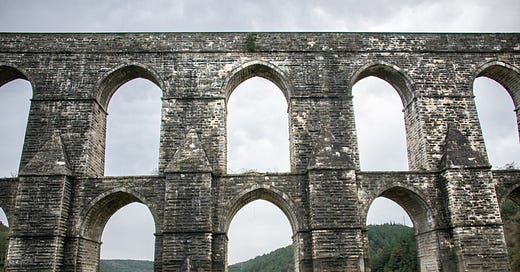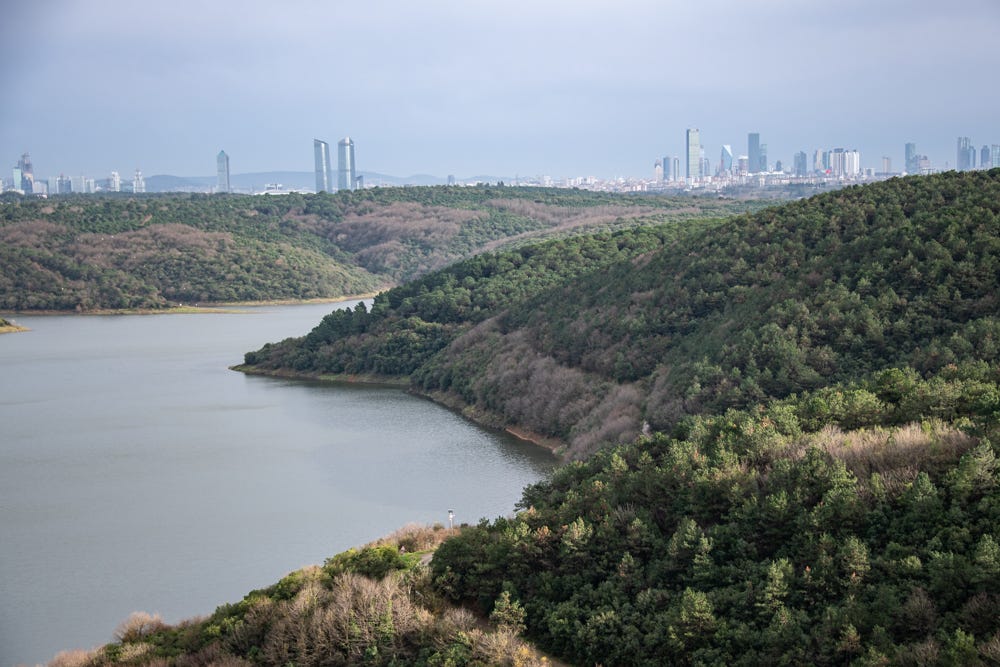İSTANBUL – There was almost zero rain in İstanbul from June to October in 2023. When temperatures soared on Aug. 14 – Turkey’s hottest day on record – the local reservoirs had reached their lowest levels in a decade.
Then, on Nov. 21 intense downpours partially replenished the city’s 10 dams, offering a grace period that sent urban planners, hydrologists and environmentalists scrambling for solutions to reverse the metropolitan region’s worsening droughts. The next day, the municipality increased the price of water by 15 percent.
“If it had not rained in the dam basins on the European side by the end of November, water shortage measures would have been implemented by İSKİ [the İstanbul Water and Sewage Administration] on the European side,” Dursun Yıldız, head of the Hydropolitics Association, told Turkey recap.
Prior to the late-fall rain in İstanbul’s European districts, the city’s resource management officials had been carefully withdrawing water from the lowest levels of dams west of the Bosphorus.
“To prevent the water crisis, water users were asked to use water more efficiently,” Yıldız said. “I can say the rain prevented a water shortage problem that would have occurred in some parts of the European side.”
In terms of both population distribution and water resources, İstanbul is divided between eastern and western water basins, or Asian and European districts, the latter of which faces several challenges in distributing water resources.
Most of İstanbul’s freshwater is located east of the Bosphorus, while most people live to the west of it – or on the European side – and the difficulties of siphoning adequate amounts of water between the two sides has exposed the entire city to dire drought risks.
Both technical and meteorological challenges hamper İstanbul’s efforts to store and distribute water to its more than 16 million residents, as the construction of a key infrastructure project that would alleviate some of the water stress – the Melen Dam – remains delayed and incomplete.
Same Old COP-Out
On a rainswept evening in early December, four environmental scientists convened at the İstanbul Policy Center for a British Embassy Türkiye International Development Programme-funded project, titled “Rainwater Harvesting for Climate Change Adaptation: Training Programme for Municipalities.”
Coinciding with the COP28 climate change conference, they spoke about the efficacy of rainwater harvesting to mitigate the effects of climate change-induced drought in Turkey.
At COP28, Turkey opposed the gradual phase-out and reduction options for fossil fuels outlined in the Powering Past Coal Alliance (PPCA). Along with countries like China and India, Turkey did not sign the commitment by 118 governments to triple renewable energy capacity by 2030, nor did Turkey endorse the health declaration at COP28, supported by 123 countries.
As COP28 was reaching a deal in Dubai, nominally referring to the phasing out of fossil fuels for the first time in the history of the conference, Akgün İlhan, professor of Water Management at Boğaziçi University, introduced panelist Prof. Ayşen Erdinçler, Head Of Department of Environmental Protection and Development at İstanbul Metropolitan Municipality.
“If there is no water there is no agriculture and world hunger will begin,” Erdinçler said. "İstanbul is a water-consuming place. This year there was a very long drought. As a result, the number of biological and psychological diseases increased. Water basins are, for us, more valuable than diamonds.”
İlhan, who led the Right to Water Campaign in İstanbul from 2012 to 2018, and presents the radio show, "Sudan Gelen" (From the Water) on Açık Radyo, has championed rainwater harvesting efforts in Turkey, petitioning for rainfall collection mechanisms in İstanbul’s building sector to mitigate the effects of drought and climate change.
“Despite its crucial role in climate change adaptation, rainwater harvesting has been considerably overlooked,” İlhan told Turkey recap. “Only in recent years, this ancient technique has gained renewed attention as cities face more pronounced impacts from climate change.”
She continued, noting in Turkey, rainwater harvesting on a parcel scale became obligatory in the 2021 Planned Areas Zoning Regulation. New buildings constructed on parcels larger than 2,000 square meters are now mandated to install a rainwater collection system.
Following the publication of regulatory mandates by İSKİ in 2018 and 2021, the collection of roof and surface water has been applied to all building projects in İstanbul on parcels larger than 1,000 square meters, though with varying degrees of enforcement.
“Regulations alone are insufficient for the effective implementation and expansion of rainwater harvesting systems. A comprehensive approach involving legislative, financial, governmental, technical, and societal actions is imperative for success,” İlhan said.
According to the İSKİ master plan 2053, the current city regulations could harvest 80 million cubic meters of rainwater per year by 2050. Along with gray water, the total recovery potential would amount to trimming 2.5 months off current annual water consumption in İstanbul.
“In order to use this potential, legislative changes, urban transformations and new infrastructure investments must be completed,” said Yıldız, who contributed to the plan.
Drier Straits
On Nov. 17, Agriculture and Forestry Min. İbrahim Yumaklı said Turkey would fall under the classification of countries experiencing extreme water scarcity by 2030, and that water shortages would become the reality for half of Turkey’s population within six years.
“Growing water scarcity is [a] critical issue, influenced by changing precipitation patterns and increasing water demand,” said Ender Peker, assoc. prof. of Urban Design and Planning at Middle East Technical University. “Poor waste management, which falls short in recycling and reducing plastic usage, and deforestation leading to biodiversity loss due to habitat destruction are also significant concerns across the country.”
Yıldız, who also leads the Water Policy Association, said he was not relieved by the short-term reprieve of November rain.
“As in İstanbul, additional water supply in many major cities of the world is provided by transfers from neighboring river basins. This inter-basin water transfer will lead to increased tensions between provinces or states as the impact of climate change increases,” Yıldız said.
Additionally, he noted sectoral water allocations are bound to stir disputes as accommodating the demands of agricultural and industrial water usage becomes increasingly fraught.
Meanwhile, Turkey’s populist political order spells disaster for policy-makers advocating to resolve environmental challenges through fact-based analysis. Less helpful is the rhetoric with which these issues are often brought to the public eye, Yıldız said.
“Sustainable water management requires rational, scientific and applicable social policies, not populist policies,” Yıldız added.
I Drought It
Eight of İstanbul’s 10 dams fell below 10 percent capacity by the fall of 2023. İSKİ Deputy General Manager Bülent Solmaz, warned in early November that even when at full capacity, İstanbul’s dams only hold enough water to meet the city’s needs for 7-8 months.
Experts at the UN Convention to Combat Desertification (UNCCD) in 2022 noted that the Middle East and North Africa are especially vulnerable to drought and that drought losses could increase. The Mediterranean and the Atlantic regions of Europe are expected to experience some of the world’s most severe drought impacts in the next 100 years.
Moreover, meteorological statistics show a decrease of 30 percent precipitation in the region, which would lead to 500-600 million people migrating north, toward Turkey.
“The population of İstanbul has increased very rapidly due to excessive internal and external migration,” Yıldız said. "The biggest challenge in adapting to changing global environments is not in finding technical solutions, but in changing our water use and water management habits.”
This newsletter is supported by readers via Substack and Patreon. Paid subscribers get full access to our recaps, reports, members-only Slack and more. We also have pun-tastic merch. All proceeds go towards sustaining our journalism.
Turkey recap is an independent news platform produced by the Kolektif Medya Derneği, an İstanbul-based non-profit association founded by our editorial team to support and elevate news media and journalists in Turkey.
Get in touch: send pitches, queries and feedback to info@turkeyrecap.com.
Diego Cupolo, Editor-in-chief @diegocupolo
Gonca Tokyol, Editor-at-large @goncatokyol
Ingrid Woudwijk, Managing editor @deingrid
Verda Uyar, Digital growth manager @verdauyar
Sema Beşevli, Editorial intern @ssemab_
Onur Hasip, Editorial intern @onurhasip
This article is part of a series of environmental reports produced with support from the Heinrich Böll Stiftung Turkey Office, and in no way can be interpreted to reflect the views of the Heinrich Böll Stiftung.










